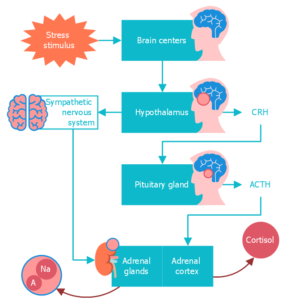Let’s talk stress!
The effects of stress is directly facilitated by two key hormones — catecholamines and cortisol. However, they can both lead to a cascade of widespread effects. In this article, we’ll explore these effects, and see how they relate to your general health.
Hormone #1: Catecholamines
When your sympathetic nervous system (your flight or fright) is stimulated, two main catecholamines are secreted: Adrenaline and Noradrenaline. The physiological effect is to conserve energy for the central nervous system and skeletal system to respond to a stressful situation. This includes:
- Increased heart rate, oxygen supply and lung function.
- Increased blood pressure
- Decreased glucose uptake into tissues due to increased blood glucose and decreased insulin release from the pancreas
- Increased triglycerides and fatty acids and decreased breakdown of cholesterol into bile acids.
- Decreased protein synthesis and increased protein breakdown
Hormone #2: Cortisol
Cortisol is a steroid hormone produced by our adrenal cortex during times of stress. This results in:
- Altered carbohydrate and fat metabolism
- Decreased T cells from overstimulation of the thymus, resulting in a weaker immune system.
- Decreased white blood cells (including eosinophils and lymphocytes), which slows the rate of healing.
- Increased gastric acid, which alters gut function and motility.
- Decreased sex hormone production, which affects reproductive capability.
- Altered thyroid production.
Here’s a simplified mind map to give you a picture of what happens:

Image source: https://www.conceptdraw.com/examples/stress
What happens in the long run?
Under chronic stress, these persisting effects can lead to:
- Weight gain
- Malnutrition
- Irritable bowl syndrome
- Inability to build muscle
- Poor recovery from exercise
- Injuries
- Lowered immunity and frequent infections
- Thyroid imbalances
- Ammenhorea or irregular menstrual cycles
- Anxiety or irritability
- Short term memory loss and brain fog
So, what now?
It’s normal to feel stressed and anxious from time to time, and the body has an amazing way of bringing everything back into homeostasis. This involves the hypothalamus pituitary adrenal (HPA) axis feedback loop, which facilitates how our body reacts to stress and then tries to bring it back into homeostasis.
There are also several steps you can take to support your body. Often it starts with a holistic assessment of your physical health, lifestyle, nutrition and career. By using an integrated approach, it enables you to better understand and remove your stressor(s).
If you can’t remove the stressor(s), then let’s find better ways to cope with it. Based on your unique circumstances, I would recommend different combinations of the following:
- Adaptogens: These are herbs that increase your body’s resilience to stress by supporting the HPA axis.
- B Vitamins, Magnesium, Glutamine, Zinc and Carnitine: These are directly involved in energy pathways and are the first to be depleted when the body is under stress.
- Vitamin C: Cortisol depletes vitamin C, which is important for regeneration of cells, increasing immunity and protecting us from oxidation damage and inflammation.
- Mindfulness: Commit to 5 minutes of mindfulness practice daily where you try to focus only on your breath.
- Gratitude log: Regularly remind yourself of three things that you’re grateful for each day
- Mindset: Change how you approach your problems. What meaning are you taking from them? Can you see how they might benefit you? No matter how stressful a situation is, there will always be both a negative and positive perspective to bring you into a perfect balance.
Looking for more assistance?
If you need help managing your stress, feel free to email kristine@wellixa.com.au and we’ll help you find your balance so you can perform at the level you choose!




